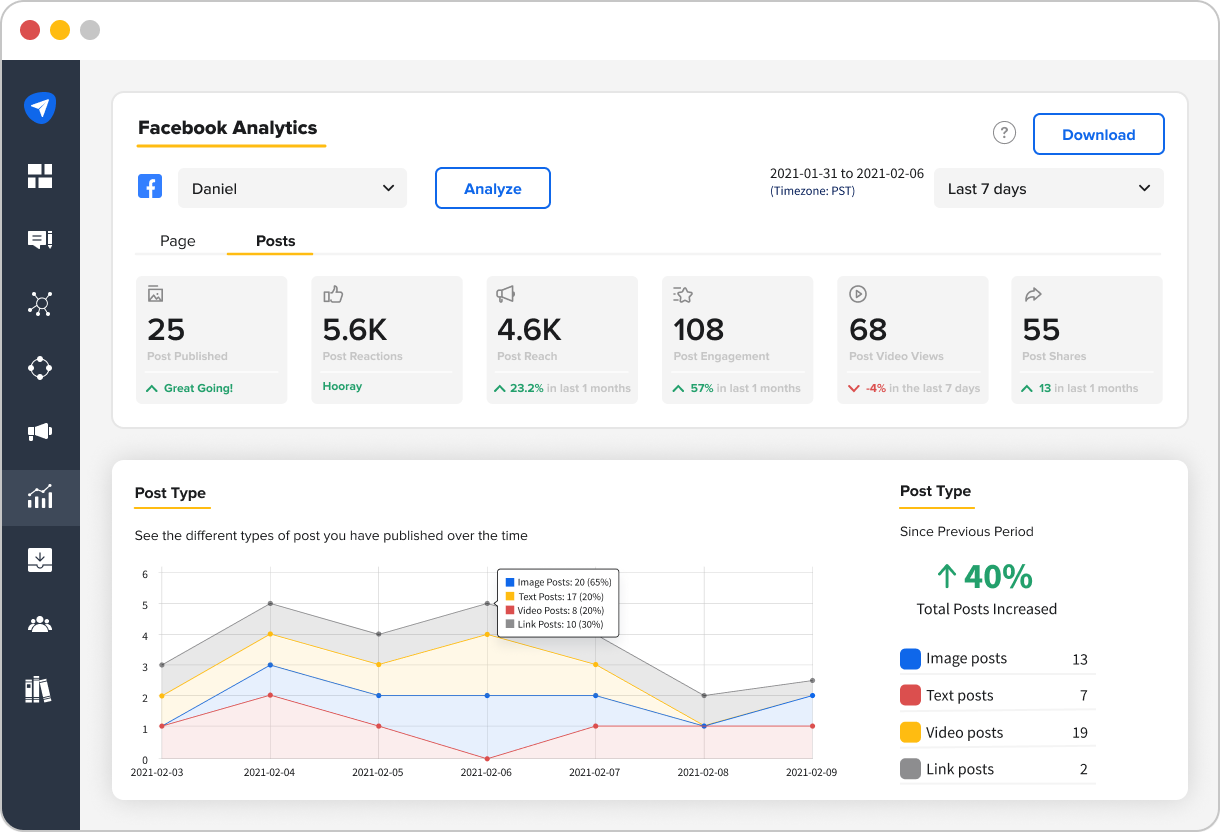Social media is more than just a platform for connecting with friends; it’s a big part of every business. Having in-depth knowledge of what works and doesn’t for your brand is crucial, and that’s where targeted social media analytics tools come into play. These tools will help you understand where to focus your time, effort, and budget.
Why?
As a marketer, you know that data-backed campaigns are the most efficient for brands. Native social media analytics tools across channels such as LinkedIn, Facebook, Google Business, and Instagram provide you with just that.
If you are new to social media analytics and have yet to learn how this dynamic tool can take your brand to the next level, this article is for you.
In this social media analytics guide, we will walk you through what it is, demystify the different tools and ways to leverage them for your brand, and help you better understand how the insights from these tools will work for your business in the long run.
Note: Remember that social media analytics is just one aspect of the wider analysis your business should be performing to make informed decisions.
What Is Social Media Analytics?
Social media analytics involves collecting, analyzing, and interpreting data from various social platforms. This data offers insights into audience behavior, campaign performance, and how social media impacts business results. It goes beyond just counting likes, shares, or comments. Instead, it dives into understanding the sentiments, trends, and conversations shaping the brand’s online presence.
At its core, social media analytics aims to decipher the vast amount of data generated on platforms like Facebook, X, Instagram, LinkedIn, and more. It’s not just about understanding what’s being said but also why it’s being said. For instance, while a surge in mentions might indicate increased brand visibility, the sentiment behind those mentions determines if this visibility is positive or negative.
But, there’s more:
The true power of social media analytics lies in its ability to combine data from social channels with other customer feedback sources, such as surveys or reviews. This holistic approach provides a comprehensive view of the customer experience, revealing the ‘what’ and the ‘why’ behind audience interactions.
Brands that harness the potential of social media analytics effectively can make informed decisions, refine their marketing strategies, and enhance customer experiences. It’s not just about reacting to the present but also anticipating future trends and aligning business strategies accordingly.
This leads us to an important question:
Why Is Social Media Analytics Important?
Understanding your audience’s behavior is a cornerstone of effective digital marketing. Social media analytics provides a deep dive into the interactions, sentiments, and patterns that emerge from online engagements. It’s not merely about counting likes or shares; it’s about interpreting these metrics to craft a more informed and impactful strategy.
Why are analytics important? They help with:
- Deciphering Audience Sentiments: Social media analytics enables brands to gauge the pulse of their audience. Analyzing interactions, from comments to mentions, helps discern whether content resonates or if adjustments are needed, offering a clear picture of the emotions behind every interaction.
- Strategic Content Creation: With insights from social media analytics, brands can pinpoint which content types—videos, blogs, infographics—garner the most attention. This data-driven approach ensures that content strategies are tailored for maximum engagement.
- Competitive Analysis: Keeping an eye on competitors is crucial. Social media analytics offers insights into competitors’ tactics, helping brands identify market opportunities and refine their own strategies.
- Optimizing Customer Interactions: As customers increasingly use social media for inquiries and feedback, social media analytics assesses the effectiveness of a brand’s online customer service, from response times to the success of chatbot interactions.
Want to see it in action?
A testament to the power of social media analytics is the case of Buffalo Wild Wings. When introducing their Pumpkin Spice Chicken Wing Sauce, they faced mixed reactions.
However, they monitored real-time discussions and sentiments by harnessing social media analytics. By identifying key influencers and tracking conversation trends, they transformed skepticism into positive engagement, showcasing how analytics can shape audience perceptions and drive marketing success.
We know now what social media analytics are and why are they important. Let’s look at tools that you can use to leverage them, shall we?
10 Best Social Media Analytics Tools
Social media analytics tools are the compass that guides brands to success. They provide invaluable insights, shaping strategies and driving engagement. Here are some of the top ones you must give a try.
1. SocialPilot
SocialPilot stands out as a comprehensive solution for social media analytics. With its integrated tools, it offers a plethora of features that make tracking and managing your brand’s image a breeze:

- Content Performance Analysis: SocialPilot allows brands to effortlessly track the performance of their content. By identifying which posts are garnering the most visibility and engagement, marketers can fine-tune their content strategy, focusing on what truly resonates with their audience.
- Audience Insights: Understanding your audience is the key to effective social media marketing. SocialPilot’s analytics dive deep into audience reach trends and growth patterns. This data-driven approach empowers brands to craft engagement strategies that align with their audience’s preferences and behaviors.
- Optimal Posting Times: Timing is everything in social media. SocialPilot’s analytics identify the best times to post, ensuring content reaches the audience when they’re most active. By analyzing activity patterns, brands can maximize their content’s visibility and engagement potential.
- Comprehensive Analytics Overview: Whether posts originate from SocialPilot or elsewhere, the platform offers a holistic view of all connected account analytics. This comprehensive approach ensures brands have a complete picture of their social media performance.
- Advanced Reporting: SocialPilot has an amazing ability to combine analytics reports. Brands can auto-schedule consolidated advanced reports for multiple profiles and networks, managing share-ready PDFs from a centralized dashboard. This feature streamlines the reporting process, making it easier for teams to share and act on insights along with their clients.
- Platform-Specific Insights: Recognizing that each social platform has its unique characteristics, SocialPilot offers specialized analytics tools for platforms like Facebook, Instagram, LinkedIn, and Google Business Profile. These tailored insights ensure brands can optimize their strategies for each platform.
SocialPilot’s analytics tools are meticulously designed to eliminate the uncertainties surrounding social media performance. The platform’s emphasis on providing easily accessible and downloadable PDF analytics reports ensures brands are always equipped with the insights they need to drive their social media strategies forward.
2. Meltwater
Meltwater is a global company specializing in media intelligence and social listening. They provide software solutions and services to help businesses monitor their online presence, track media coverage, and gain insights from social media and other online sources.
Meltwater collects data from various online channels, including social media platforms, news websites, blogs, and forums. Their social media analytics capabilities allow businesses to understand their brand’s reputation and industry trends.
3. Hootsuite
Hootsuite is a social media calendar and planner with analytics capabilities. You can measure and analyze performance across different social media platforms in one streamlined place. Reports inform the best times to post based on when your audience is the most active and identify top-performing posts. Pre-built templates make reports customizable and easy to digest.
4. Grow
Grow users can gain full visibility into engagement on all their social accounts. The tool integrates with HubSpot, Salesforce, Google Ads, Facebook, Marketo, and Microsoft Office to view all data in one place.
Grow breaks down complex data into graphs and visuals, and your social reports are easily sharable, which is helpful if multiple people are working on the same project. Grow’s reports are built with metrics chosen by the user — meaning you can customize reports to suit your needs.
5. Mailchimp
Mailchimp is a full-service marketing platform that offers analytics for social media ads. The platform is easy for small marketing teams and requires little time to pour over the accompanying analytics.
With Mailchimp, you’ll have an audience dashboard, a page dedicated to understanding their behavior. Additionally, the software offers tools to look into smart targeting and mobile integrations. These tools can diversify a social strategy and deliver higher engagement numbers by helping you create content that specific audiences will respond to.
6. Brandwatch
Brandwatch is a consumer intelligence tool and social media management solution with analytics capabilities. Social insights like social listening and competitor benchmarking can inform your content creation. You can better understand the audiences engaging with your social content with audience profile cards and view key data in one place with customizable dashboards.
7. Rival IQ
Rival IQ is a premium tool for social reporting, audits, and competitor analysis. If you often hire social media influencers, this tool lets you track their performance. Their reporting is comprehensive and aimed at agencies that must compare competitors for their clients.
8. Talkwalker
Talkwalker offers analytics related to social conversations beyond your owned social properties, including mentions, brand sentiments, important influencers, and author lists. Talkwalker is useful for spotting activity peaks in conversations about your brand. This can help you determine the best times for your brand to post on social media.
9. Keyhole
Keyhole lets you report on everything: social media campaigns, brand mentions and interactions, hashtag impact, and even influencer campaign results. But that is not all – you can drill down into your impressions, reach, the share of voice, and even analyze your competitor’s social media strategies.
Furthermore, if you are utilizing influencer marketing as part of your strategy, Keyhole has reporting capabilities that will let you identify the ideal influencers to work with.
10. Sprout Social
Sprout Social is a social media management tool with expansive analytics and reports that help you understand the performance of all your social accounts. You can configure and customize reports and metrics to help scale your business’s presence on social.
While these paid tools have far more added features and benefits, if you’re looking for free tools, we recommend these…
7 Native Social Media Analytics Tools
Understanding the performance of your content on social media platforms is essential for refining strategies and connecting more effectively with your audience. Each platform offers its own native analytics tools, tailored to provide insights specific to their environment. Here’s a closer look:
1. Facebook Insights
Facebook’s native tool, Insights, provides a detailed analysis of your content’s performance. It tracks metrics such as post reach, engagement rates, page views, actions on the page, and even the times when your audience is most active.
Additionally, it offers a breakdown of audience demographics, including age, gender, and location, helping brands understand and target their audience better.
How to access: Navigate to your Facebook Page and click on the “Insights” tab located at the top menu.
2. Instagram Insights
Instagram Insights offers a comprehensive view of your content’s performance on this visual platform. Beyond tracking likes and comments, it dives into metrics like profile visits, website clicks, and reach. It also provides insights into Stories and Reels performance, follower demographics, and activity trends.
How to access: You can view your Instagram insights if you have a Business Profile. Once you’ve done that, head to your profile page in the app, click the menu icon on the upper-right corner, and click on “Insights.”
3. X (Formerly Twitter) Analytics
Twitter’s tool provides a real-time analysis of how your tweets are performing. The 28-day summary showcases tweet impressions, engagement rates, link clicks, and retweets. Additionally, it offers insights into your followers’ interests, their demographics, and even the times they’re most active.
How to access: Log into your account, click on “More” from the sidebar, and choose “Analytics,” or simply visit analytics.twitter.com.
4. LinkedIn Analytics
LinkedIn’s analytics tool is tailored for a professional audience. For a page belonging to your organization or company, it provides insights into post impressions, clicks, and engagement metrics. You can also view follower trends, their demographics, and the top companies they hail from, helping B2B brands refine their content strategy.
How to access: Sign in to your Page admin center from your LinkedIn Company Page and click on “Analytics”.
5. Pinterest Analytics
Pinterest’s tool offers insights into pin performance and audience engagement. It tracks metrics like daily impressions, saves, link clicks, and even the interests of your audience. This helps brands understand what content resonates most with Pinterest users.
How to access: Pinterest analytics is only available for business accounts. Log into your Pinterest business account and select “Analytics” from the top menu.
6. YouTube Analytics
YouTube’s tool focuses on video performance metrics. It provides insights into watch time, viewer demographics, traffic sources, and audience retention. It also offers data on subscriber growth, likes, shares, and comments, helping creators refine their video content strategy.
How to access: Navigate to YouTube Studio from your account and select “Analytics.”
7. TikTok Analytics
TikTok’s analytics tool provides insights into content performance on this rapidly growing platform. It tracks metrics like video views, engagement rates, follower growth, and trending sounds used. This helps creators and brands understand what content is trending and resonates with the TikTok audience.
How to access: Go to your TikTok profile, click on the three dots (settings), and select “Analytics.”
Now, with so many paid and free social media analytics tools to choose from, let’s dive deeper by discussing the…
5 Tips to Leverage Social Media Analytics Tools
We’ve got the tools to analyze our social media, but where do you begin? Here are five simple ways you can analyze your social media.
1. Analyze Sentiment and Emotional Engagement
Prompt analysis of your audience’s sentiments and emotional engagement after going live with a social media campaign are crucial for your brand.
With the use of advanced analytics tools, you can find out how your post is resonating with the audience and use the data to craft content that relates to them at a deeper level, resulting in more meaningful engagement.
2. Embrace Targeted Marketing through Analytics Insights
Social media analytics play a pivotal role in revealing valuable insights about customer behavior, campaign optimization, and driving business growth. This data also reveals unexpected target segments, which can aid your business in channelizing marketing efforts accordingly.
A good example here is that of Airbnb, the global travel community that offers unique homes and experiences. They used social media analytics to understand the desires and preferences of their users and found that travelers were seeking more local and authentic experiences.

Based on this insight, Airbnb launched the “Live There” campaign, urging travelers to not just visit a city but live there, even if it’s just for a night. The campaign was a massive success and resonated with the audience, leading to increased bookings.
You can also…
3. Enhance Customer Interaction through Social Analytics
Social media analytics involves the collection, measurement, and analysis of data obtained from various social media platforms. This includes customer feedback that your brand can use as a repository to better understand customer challenges, resolve complaints and ultimately enhance the user experience.
4. Strategically Socialize Content With Analytics Guidance
Analytics tools are essential for businesses aiming to expand their audience reach and increase sales. More than just numbers, these tools provide insights into the audience’s mindset, revealing what they want to see and hear from a brand.
Tracking the performance of every post that goes out across social media channels can help in identifying what works best for your brand with the desired audience. The use of analytics guidance will further help you navigate what type of content your brand should be reposting for enhanced engagement.
Don’t forget to pay attention to…
5. Competitor Analysis and Influencer Mapping
Keeping a check of what your competitors are up to is essential to stay ahead of the curve and garner more visibility. For instance, Coca-Cola and Pepsi have been long-standing competitors.

By using social media analytics, Pepsi could monitor the engagement and sentiment around Coca-Cola’s campaigns, allowing them to strategize their own campaigns more effectively.
Similarly, mapping influencers will help you understand who the best fit is for your brand and how you can leverage their content for your campaigns. Analytics tools help you with this data by comparing engagement levels with competitors and mapping influencers to boost your marketing reach.
Conclusion
Analytics are crucial for social media marketing, turning mere posts into strategic insights. Understanding your digital audience’s preferences and behavior enables you to align your marketing strategy with them.
Social media analytics tools, such as SocialPilot, provide you with a detailed analysis of your social media accounts. This can help you improve performance, optimize your budget, prove your impact, and form audience relationships that will guide them to the point of purchase.
Choosing the right social media analytics tool for your business should be seamless, aligning with your business objectives and delivering precise insights into what works and what does not. From tracking content performance to identifying the best times to post, these tools are indispensable in shaping a successful social media presence.
We hope this social media analytics guide has served as a ready reckoner for you as you embark on enhancing your social media strategy with analytics.



